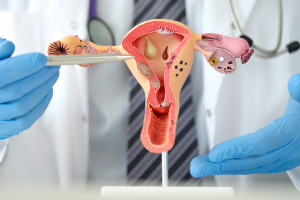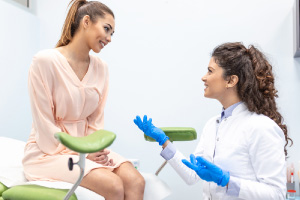Pap Smear FAQs
 The Pap Smear or Pap test is a common procedure in women’s health services. It is non-invasive and checks for cancerous cells developing in the cervix, the lower, narrow end of the uterus. Women ages 21 and up should get a pap smear every three years.
The Pap Smear or Pap test is a common procedure in women’s health services. It is non-invasive and checks for cancerous cells developing in the cervix, the lower, narrow end of the uterus. Women ages 21 and up should get a pap smear every three years.
Pap smears also help with other conditions like inflammation or infections.
What Does the PAP Smear Procedure Entail?
During a Pap smear, a small brush delicately removes cells from the surface of the cervix and the area around it. The smear, or cell sample, is then checked under a microscope for abnormal cell development. Specifically, cancer cells.
A Pap test is often one part of a full pelvic exam but can be considered a distinct service. A pelvic exam is sometimes called an internal exam. The entire female reproductive system, ovaries, and vulva are examined for anything unusual.
 Why Should I Get a Pap Smear?
Why Should I Get a Pap Smear?
It can detect cancerous cells early. Some women might think they’re too young to start testing for precancerous cells. However, most doctors recommend that women start getting this procedure at 21 years old.
From ages 21 to 65, Pap testing should be done every three years. If a woman is over the age of 30 or 35, they might consider getting a Pap smear every five years or opt for HPV testing instead.
What Can I Expect During My First Pap Smear?
 You may be asked to undress completely or remove clothing from the waist. You will lie down on the exam table with your knees bent and heels in stirrups.
You may be asked to undress completely or remove clothing from the waist. You will lie down on the exam table with your knees bent and heels in stirrups.
The doctor or healthcare provider will insert a speculum into the vagina in order to better see the cervix. The speculum is a device with two arms that resemble a duck’s bill. It’s common to feel a bit of pressure in the pelvic area during the procedure.
A small brush is used to gently scrape cells from the cervix. This doesn’t usually hurt, but you could feel some discomfort or light scratching. The cells are put on a glass slide to be examined under a microscope.
It’s advised that you rest for a few minutes after the procedure. Wear a sanitary pad for any light bleeding or spotting that could occur. If there is any cramping, take some ibuprofen or place a warm pad on the sore area. Cramps should last 1 or 2 days. If they last longer, consult your doctor.
Do Pap Smears Hurt?
It can feel uncomfortable, but it shouldn’t hurt. The healthcare provider will insert a lubricated speculum into the vagina to better see the cervix. They might press down on the lower abdomen during the procedure.
What are the Risks of a Pap Smear?
It’s a safe and widely practiced procedure. You shouldn’t have any pain or cramps afterward. You might experience some light bleeding or spotting, but this shouldn’t last long.
Who Should Consider Getting More Frequent Pap Smears?
Women who are in the following demographics should consider more frequent checkups:
- Those who have tested for precancerous cells during a prior Pap smear
- Those with a history of cervical cancer in the family
- Chronic smokers or tobacco users
- Those who are HIV positive
- Those with a weakened immune system from chemotherapy, an organ transplant, or chronic corticosteroid use.
Who Should Avoid Getting a Pap Smear?
Women who are over the age of 65 or who have had a full hysterectomy should avoid getting a pap smear. According to the National Cancer Institute, the risk of an HPV infection developing into cancer is very low among women over the age of 65.
Should I Shave for a Pap Smear?
You can choose to shave. This won’t impact the test results. A cautionary word: shaving or waxing can cause irritation around the cervix area, which might mean more discomfort.
Can You Refuse the Pap Smear and Still Take Birth Control?
You don’t need a pap smear to take birth control. You also don’t need to discontinue taking birth control before your pap smear appointment.
Why are Pap Smears Recommended to Be Done Every 3 Years?
It often takes 3 to 7 years for cervical cells to become cancerous. The United States Preventative Services Task Force (USPSTF) recommends that women ages 21-29 get a Pap smear every three years. For women ages 30-65, it’s recommended that they get a combination of a pap smear and HPV testing every five years.
How Do I Stay Calm During a Pap Smear?
It’s normal to feel a bit nervous about the procedure. But just understand that it is light and noninvasive.
What Should I Avoid Doing After a Pap Smear?
You should avoid having sex or using tampons for 2 to 3 days after receiving a pap smear. Bleeding should stop after a few hours but can last for 2 days. If it lasts longer, consult a healthcare provider about your next steps.
Can Pap Smear Tests Detect Yeast Infection?
Yes. A pap smear can detect bacterial vaginosis, an infection that develops into a yeast infection. A yeast infection can interfere with the diagnosis readings. Abnormal cells might appear, but this isn’t due to cancer. It’s the bacteria interfering with the results.
Can I Get a Pap Smear While On My Period?
Getting a pap smear while menstruating is not advised, as bleeding can negatively affect the physician’s ability to extract untainted cells from the cervix area.
Can a Pap Smear Detect an STD?
No. It’s not designed to test for sexually transmitted diseases. Pap smears look for cancerous cell development in the cervix. These cancer cells often develop due to HPV, a sexually transmitted disease.
Do Pap Smears Cause Inflammation?
Inflammation of the cervix is nothing to be worried about during a Pap test. However, it can cause abnormalities within a Pap smear test. Inflammation typically means that some white blood cells appear on the pap smear pallet.
How Do I Prepare for a Pap Smear?
According to the Mayo Clinic, one should avoid intercourse, douching, or the use of most vaginal inserts such as medicines or spermicidal foams, creams, or jellies for two days before the appointment. These will cover up cancerous cells.
Schedule your appointment 5 days after your period. Do not undergo this procedure while menstruating; the blood will prevent a readable cell sample.
Schedule Health Checkup with Northland Women’s Health Care
Scheduling regular health checkups with an experienced OB-GYN is a great way to get a head start on your health and wellness goals. Schedule your first appointment today by calling one of our Northland Women’s Health Care staff members at 816-741-9122.
